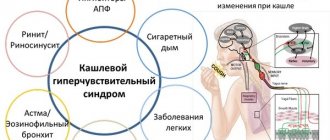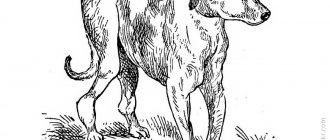Respiratory tract diseases are not common in dogs. And many owners, having noticed a cough in their pet, simply turn a blind eye to it. “It will go away on its own,” people are used to thinking when it comes to animal diseases.
But the cough may not go away, and moreover, it may lead to serious consequences. Bronchitis is one of those diseases that is best treated as soon as something wrong is noticed. This article will help you recognize the symptoms of the disease and take the necessary measures.
Types of bronchitis
Bronchitis is inflammation of the bronchi. It is almost as common among dogs as it is among people. Depending on the course of the disease, acute and chronic types are distinguished.
Acute bronchitis - characterized by a bright course. Appears quickly and spontaneously, lasting from 3 days to 3 weeks. A cough begins, which gets worse when the leash is pulled or if the dog is in cold air. It occurs without fever, except when it is caused by an acute viral infection.
Chronic - regardless of the cause. If a dog has been coughing for more than two months, it is clearly chronic bronchitis. It is characterized by coughing, harsh breathing, and wheezing is often heard. You can observe increasing shortness of breath over time.
In addition, you may notice that your pet refuses physical activity. The chronic course is especially dangerous because it entails severe complications, for example:
- Bronchiectasis is a chronic purulent process in insufficiently functioning bronchi. It can be not only a complication of bronchitis, but also severe rickets, a tumor of the respiratory tract or a foreign body in the bronchi. The symptoms of bronchiectasis are similar to inflammation of the bronchi, however, the necessary treatment is carried out only surgically, so it is very important to diagnose this pathology in a timely manner.
- Emphysema is increased airiness of the lungs due to dilated, overstretched alveoli. This pathology occurs in dogs that bark frequently and violently, due to mechanical overextension.
Looking at the reasons that cause inflammation of the bronchi in dogs, primary and secondary inflammation are distinguished.
Primary ones usually occur due to hypothermia or inhalation of irritants. Predisposing factors may be:
- Walking in the rain or in severe frost.
- The dog's bed is in a draft, or if the dog is lying on a cold floor.
- Swimming in cold water, especially in windy weather.
And secondary ones occur after the pet has contracted other diseases:
- Infectious viral bronchitis - begins after or during a dog's illness with distemper, adenovirus, rhinotracheitis or other diseases. It occurs acutely and with fever, which is a distinctive symptom.
- Allergic (eosinophilic) bronchitis is the result of a specific reaction of the body to any allergen. This could be a foreign protein in food, plant pollen, an insect bite, and much more. It differs from other types in that deterioration occurs rapidly, as well as improvement, when the diet or environment changes.
- Parasitic bronchitis occurs if the dog's lungs are infected with lungworms, such as heartworms. With a high helminth infestation, dogs even cough up the helminths themselves or their larvae along with sputum during a coughing attack.
Description of bronchitis in dogs and its difference from similar diseases
With this disease, there is an increased production of protective mucus covering the bronchi. Its excess accumulates in the lungs, causing inflammation of the airways. Due to irritation of internal tissues, the patient develops a cough and shortness of breath.
The lumen of the bronchi gradually narrows, and connective tissue grows on their muscle fibers. As a result of loss of elasticity, the organ ceases to cope with moisturizing, cleaning and warming the incoming air. Affected mucous membranes attract pathogenic microorganisms that provoke secondary infections.
The symptoms that arise can be easily confused with the following pathologies:
- Pneumonia
. Accompanied by a wet cough with copious sputum containing purulent inclusions.
- Bronchial asthma
. Eliminates the presence of mucus and fever.
- Lungworm infection
. The patient's breathing is complicated by whistling, and coughing attacks are often accompanied by vomiting.
- Pleurisy
. Characterized by severe pain in the side, aggravated by inhalation.
- Foreign body stuck in the upper respiratory tract
. In addition to coughing, there is profuse salivation.
Despite the differences, the only reliable way to make a diagnosis is through examination at a veterinary clinic. Avoid taking medications without a doctor's prescription. Any mistake made by the owner can cost the pet his life.
Symptoms
If you do not take into account some features of the course of individual types of bronchitis, the main symptoms are the following:
- Long, continuous painful cough.
- Redness and swelling of the mucous membrane of the conjunctiva of the eye, pharynx and bronchi. The latter can only be seen during bronchoscopy.
- Large secretion of mucus (phlegm).
- Wheezing that can be heard even from a distance.
- Loss of appetite.
- Reduced activity, refusal to walk or any activity.
Even the appearance of one of these symptoms should raise suspicion and alert the animal owner.
Risk group
First of all, weakened animals are at risk:
- old dogs;
- puppies with undeveloped immunity;
- sick or recovered pets whose immune system is weakened.
Some breeds are prone to certain types of this disease:
Eosinophilic: Rottweilers and Arctic breeds, mongrels, Jack Russell terriers, cocker spaniels, German shepherds, Labrador retrievers, dachshunds.
Primary is more common: in hunting dogs, brachycephalics (due to structural features), large breed dogs.
Animal care
It is necessary to reconsider the care of the animal, surround it with care and attention. As we have already said, food and drink should be warm and easily digestible by the body. Rice and oatmeal, boiled and pureed chicken, warm kefir or milk - this is what should form the basis of the daily menu. It is not recommended to give dry food until recovery.
You can add a decoction of sage, chamomile or eucalyptus to warm water, or you can offer warm rice decoction. If a dog has bronchitis, most likely its body is deficient in vitamins A, C and E; this must be taken into account when creating a daily menu. It is advisable to give a sick pet vitamin and mineral complexes.
It is important to remember that if you notice a cough, you should not put off going to the doctor. The sooner the disease is detected, the sooner recovery will occur. This will take one to a maximum of two weeks, while getting rid of the chronic form will take months.
Currently reading:
- The American Cocker Spaniel is an adroit hunter and loyal friend.
- Actions to take in case of an epileptic attack and a shaking dog
- Thyroid dysfunction in dogs (hypothyroidism)
- Tips for proper dog burial
Treatment
To cope with any disease, you first need to make a correct diagnosis. So with inflammation of the bronchi in dogs, it is necessary to establish not only the disease itself, but also the cause that caused it and at what stage the pathological process is currently located. Therapeutic measures completely depend on this.
A correct diagnosis can only be made in a clinical setting. Do not neglect your pet’s health and contact a veterinarian in a timely manner!
First aid:
- Arrange a warm place in the room without drafts.
- Provide adequate feeding and warm drinks.
- Contact a veterinary clinic for a full diagnosis.
Acute bronchitis is the easiest to treat; most often it is enough to take a week's course of antibiotics and you will get a healthy pet.
In cases with a chronic course, you will have to show diligence and patience; treatment can take up to two months, and antibiotics alone will not do.
Treatment should be comprehensive, expectorants, anti-inflammatory drugs (often glucocorticoids - a hormonal drug) and other measures are prescribed, depending on the symptoms that appear.
Treatment at home is possible only after visiting a veterinarian, when you already have all the necessary recommendations.
Do not self-medicate if you really want to help your pet.
Diagnosis at the veterinarian
When examining a four-legged patient, the veterinarian needs to make sure that the existing symptoms do not belong to similar pathologies. For this purpose, the following studies are used in diagnosis:
- listening (auscultation) and tapping (percussion) of the lungs, allowing you to assess the frequency and rhythm of breathing;
- clinical and biochemical blood tests showing deviations in basic parameters;
- throat swab analysis to help detect the pathogen;
- bacteriological culture, which determines the sensitivity of bacteria to antibiotics;
- bronchoalveolar lavage, or bronchoscopy, revealing edema, amount of exudate and erosive formations;
- X-ray recording the condition of the lungs.
After collecting anamnesis and receiving the results of the studies, treatment is selected for the pet. It depends not only on the cause of inflammation, but also on the type.
Prevention
- The dog's area should be protected from drafts.
- The dog should not lie on a cold floor.
- Timely vaccination and treatment against internal and external parasites.
- A complete diet.
- It is worth refraining from walks or at least shortening them to a minimum in severe frost or rainy weather.
- Do not allow your dog to bathe in cold water.
FAQ
After bronchitis, the dog wheezes, what should I do?
If your pet is wheezing, he is most likely still sick. The bronchi have not recovered to their healthy state, and mucus continues to be released. If this appears after treatment, this is a bad sign. It signals that the inflammation has entered a chronic stage, and recovery efforts will take more time and effort for both the pet and the owner.
Is it transmitted to humans and cats?
Primary cannot be transmitted to either humans or other animals. Since this is inflammation caused by hypothermia and no infectious objects (viruses, bacteria, etc.) are involved.
In the case of the secondary, everything is more confusing. In any case, a person cannot become infected, since the pathogens are different for us and animals. But it can be transmitted to a cat, but not directly. Your dog's feline friend can pick up a parasite or infection from her that is specific to both species, and this disease can lead to bronchitis.
Briefly about the main thing
- Bronchitis is inflammation of the bronchi. It can be primary and secondary, and the course is acute and chronic.
- The main symptom is a prolonged cough in the absence of fever (except in cases of infectious bronchitis).
- Weak animals and some breeds are prone to the disease: Arctic, Rottweilers and other brachycephalic dogs, large dogs.
- Treatment is prescribed by a doctor after a full diagnosis and identification of the cause and stage of the disease.
- The basis of prevention is timely vaccination and treatment against parasites, as well as high-quality living conditions.
- Dog bronchitis is not dangerous to humans.
Clinical picture
The main symptom of acute bronchitis is a cough. At first dry, “barking”, after 3-4 days it gives way to wet. The cough is so strong and debilitating that it is often accompanied by vomiting or retching. The puppy is wheezing and breathing noisily due to rhinitis. There is a risk of hypoxia; this phenomenon is indicated by a blue discoloration of the tongue and gums.
The pulse quickens, the temperature may rise, but in most cases, acute bronchitis occurs without hyperthermia. The dog becomes lethargic, apathetic, refuses to eat, and therefore may lose weight.
The chronic stage of the disease is a long-term inflammatory pathology of the bronchi and occurs if acute bronchitis cannot be cured within 2 months. In dogs, this disease progresses very slowly and is not 100% curable.
Symptoms of bronchitis in dogs (chronic stage):
- cough for 2 months;
- difficulty breathing, wheezing;
- dyspnea;
- pallor or blueness of the skin and mucous membranes;
- lack of appetite;
- chronic fatigue.
At this stage, the cough is usually dry, but during an exacerbation, sputum appears. If left untreated, the animal develops chronic obstructive pulmonary disease (COPD).











